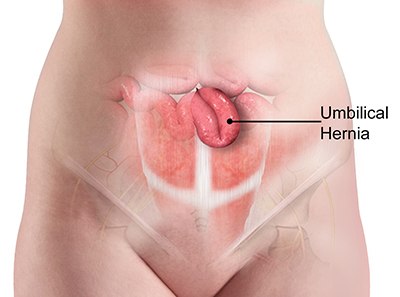
An umbilical hernia is a weakness that develops in the abdominal wall through and around the belly button, called the umbilicus. A bulge or sac containing fat or intestine pushes out through that weakness, sometimes causing an “outie” belly button. Most patients with umbilical hernias first notice a belly button bulge or discomfort. Over time these hernias can get larger and more uncomfortable as the hernia sac gets pushed out from inside the abdomen. Like other hernias, an umbilical hernia in an adult will not go away or get better without treatment.
Umbilical hernias carry the risk of becoming stuck or “incarcerated,” which could cause strong pain, nausea, vomiting, or the inability to pass gas from the rectum. This is an emergency, and if this happens, you should contact your doctor immediately or go to the emergency room.
Because of the risk of incarceration and symptoms caused by the umbilical hernia, surgical repair is recommended for most patients. At Mount Sinai, surgical repair of small umbilical hernias is usually done using the traditional “open” surgery method. Larger umbilical hernias are classified as ventral hernias, and can be repaired with either “open” or laparoscopic techniques.
After surgery, you are usually able to leave the hospital on the same day, and patients usually take about three to five days off work after an open umbilical hernia repair.Postoperative recovery depends on the size and difficulty of the hernia repair. Pain is controlled by medications prescribed to you upon discharge from Mount Sinai. You will be able to walk after the surgery and usually need about three weeks after surgery before resuming heavy physical activity.
During gestation, the umbilical cord passes through a small opening in the baby’s abdominal muscles. The opening normally closes just after birth. If the muscles don’t join together completely in the midline of the abdominal wall, an umbilical hernia may appear at birth or later in life.
In adults, too much abdominal pressure contributes to umbilical hernias. Causes of increased pressure in the abdomen include:

Copyright © 2025 Dr. Sandhya Bade | All Rights Reserved | Created & Crafted By Itorix Infotech
WhatsApp us
